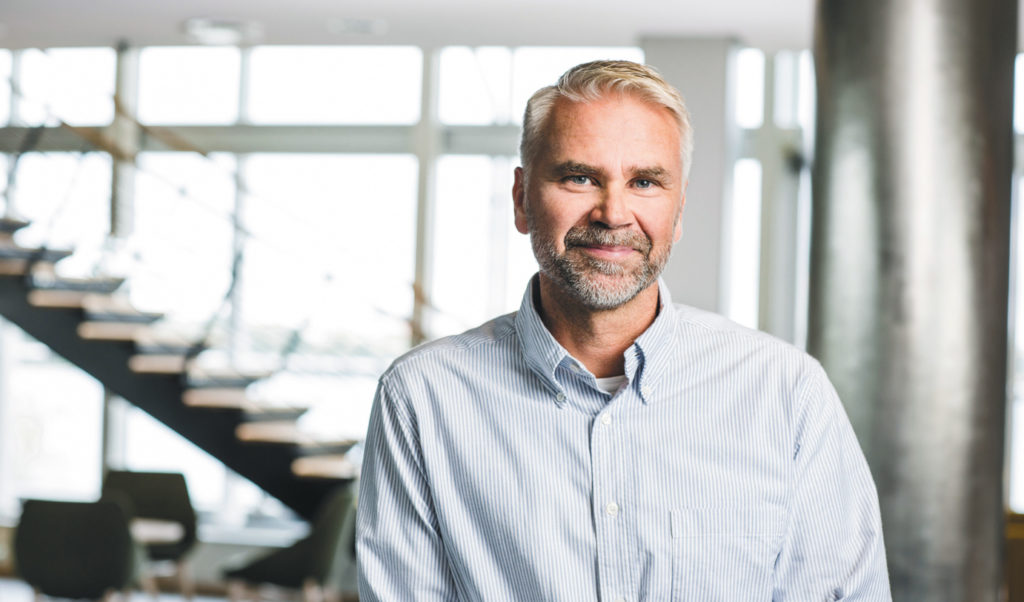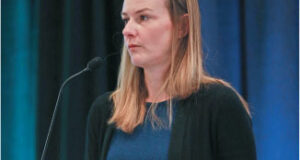MARK RUSHTON
With some 52,000 ambitious forest owners as members, it’s not only planting a lot more trees that is in the cards at Södra, although that is happening as well. The company recently launched a multi-million seedling program that will see it produce 20 percent higher forest growth heading toward 2050. Yet there are also rafts of other things going on at the company, including ongoing capacity expansion and major innovation in new product areas, including biofuels and textiles.
But first there is the pulp. Producing some 1.85 million metric tpy, Södra cell is one of the largest market pulp producers in the world, making a wide range of mainly softwood grades for varying paper properties. It also makes 170,000 tpy of dissolving pulp for textiles. The company operates from three mills across the south of Sweden—Värö, Mönsterås, and Mörrum—and each site has seen major programs of expansion and updating, including additional investments for the conversion of side streams to produce new bioproducts.
“Our forest owners are very keen on growth, so we are constantly looking at all areas around our operations where we can fulfill this ambition,” says Magnus Björkman, Södra Cell’s president since July last year. Björkman has a lot of experience in the industry, having worked formerly in senior roles at Stora Enso and Tetra Pak, and as head of Södra’s Mörrum pulp mill.
“When it comes to pulp, we are continuously looking at ways to increase capacity and efficiency, hence the major expansion program we carried out at our Värö mill in 2016,” continues Björkman.

Södra spent some SEK 4.2 billion (US$415 million) on the expansion at Värö, which saw the mill rise from a capacity of 425,000 to 700,000 metric tpy, making it one of the largest softwood sulphate pulp mills in the world. One of the bonuses of the expansion in 2016 was the realization recently that there was more the mill could expand with minimal investment. Björkman explains: “Over the last year we have gone through the mill and measured the extra capacity we have in the various departments and we are pleased to have found that we can increase the capacity of the mill even further, by at least another 150,000 metric tons annually.
“We have a feasibility study ongoing that has revealed that, by debottlenecking a few areas, adding a new wash press, some pumps and various mid-size adjustments, the capacity increase can be reached with no huge investment. We are really pleased about this.”
Södra’s other mills are not neglected when it comes to expansion and increased efficiency. The company recently invested in a new evaporation plant at its Mörrum mill that will help in its long-term goal of a capacity increase to 500,000 metric tpy. The mill makes 300,000 metric tpy of high quality softwood pulp as well as 170,000 metric tpy of dissolving pulp from hardwood for the production of textiles.
“We are also looking at a possible expansion of capacity at our Mönsterås mill in the future,” adds Björkman.
NEW PRODUCT AREAS FOR THE CIRCULAR BIOECONOMY
With a firm handle on expanding its pulp production, Södra is also progressing well on the production of other added-value bioproducts from the side streams at its mills. This is becoming an increasingly interesting area for pulp producers as the replacement of fossil fuel derived products becomes more and more attractive for companies wishing to lower their carbon footprint.
In recognition of this drive for bioproducts, a major event took place recently at Mönsterås when the world’s first commercial biomethanol plant was installed at the mill. Supplied by Andritz, the plant has the capacity to produce 5,600 tons of biomethanol a year, which will go to replacing methanol usually derived from fossil fuels. “This is a really interesting and exciting area for us,” says Björkman, “and one we will continue to grow into. The end products from our biomethanol plant are of a high quality and can go into areas such as marine fuel instead of aviation and fuel for trucks.
“This has not been an easy process; we are pioneering here and are the world’s first at making ‘clean’ commercial quality biomethanol. In the long run, and when the plant is truly optimized, it will be a pretty much automated process that we can simply run from the control room of the mill.”
Södra plans to have all of its production fossil-fuel free by the end of this year, and all of its transportation fossil-fuel free by 2030.
Another innovative project at Södra contributing to the circular bioeconomy is large scale textile recycling, another “world’s first.” A major problem when it comes to textile recycling is that fabrics are often made of blended materials—for instance, cotton and polyester, which are then often sent to landfill. Södra has developed a method to separate out the pure cotton fibers and mix them with its own dissolving pulp from its Mörrum mill, making totally new textiles.
“We have developed and patented the textile recycling process that takes post-consumer clothing waste and turns it into viable textiles when mixed with dissolving pulp from our line 1 at Mörrum,” explains Björkman. “This is really exciting as it provides an answer that many fashion houses are looking for. Clothing is coming under the spotlight as a major polluter of the oceans with microplastics, as well as having to go to landfill. At the moment we are running pilot trials at Mörrum, but we are looking at increasing volumes and see this as an area that will be one of constant growth in the future.”
Södra recently won the prestigious Fastmarkets RISI PPI Award for Environmental Leadership—From Sustainable Forestry to Waste Management for its recycled textile project.
GETTING THE MESSAGE OUT
Another prestigious PPI award Södra won recently was Bringing Paper to Life—Marketing Campaign of the Year Award. Björkman says, “We are delighted to be honored with these awards, as it tells us that we are on the right track and it is truly fantastic for our owners to see us recognized in this way.
“But it is also really important that we are seen to get the message out about our sustainability story. We carry out a customer survey every two years and one of the repeated requests we receive is to help our customers get the message out and show the world about how sustainable the pulp and paper industry is. That is why we put in a lot of effort to create such impressive and resonating campaigns.”
Björkman is also keen to stress the importance of all forest products industries when it comes to carbon emissions. “One other subject that could be highlighted much more is the reduced CO2 impact when choosing forest products for all types of uses. Not only does our industry absorb huge amounts of CO2 growing our forests, we also have the product ‘substitution effect’, where we are replacing products that are much higher in CO2 , for instance steel or concrete for construction.
“This mixture of absorption of the forest and the substitution effect has a hugely positive effect on the reduction of emissions,” he continues. “We have calculated in Sweden that Södra’s positive effect of reducing the fossil emissions corresponds to 20 percent of the total fossil emissions in Sweden. Clearly this should be taken into consideration when choosing what products to use across all industries.”
What challenges and opportunities does the world hold in the future of the pulp and paper industries?
Björkman concludes: “As we have seen, the paper industry is one in transformation. Some paper grades and qualities will disappear, but the capacity will be replaced with other grades, for instance packaging, tissue, and hygiene products. There will of course be shutdowns and new start-ups, as there always have been, but in general we are not in a negative situation and there is a lot of growth still to be had globally.
“Importantly, we need to continue to market ourselves to the world, and continue to educate our politicians as to what a great story the pulp and paper industries have to tell.”
This interview took place as the global coronavirus pandemic quickly developed. Södra stated its commitment to do its utmost to supply its customers with all they need for the production of vital paper industry products.
Mark Rushton is senior editor, Europe and Asia, for Paper360°. Reach him at [email protected].
 Paper 360
Paper 360

